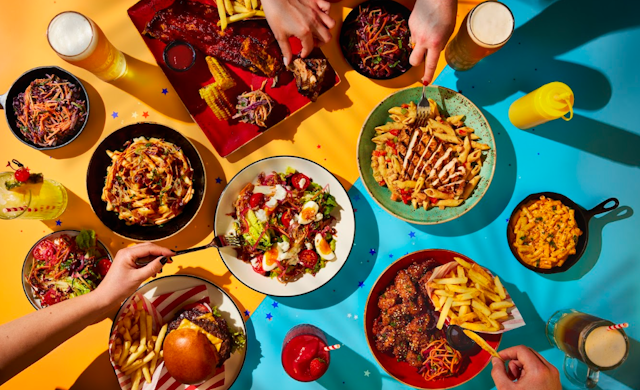How TGI Friday’s made its media more cost-effective in tough economic times
You can’t convince people to spend money going out for food when they don’t want to go out, so it’s a waste of media dollars trying. This is the hard truth TGI Friday’s faced as the cost of living spiraled.

Lessons from TGI Friday's media pivot / Viktor Forgacs on Unsplash
Restaurants and bars have been hit the hardest by the cost of living crisis, with eating out and alcohol some of the easiest cuts people can make. This week, Diageo posted its first annual sales decline since 2020, sending its shares tumbling, while McDonald’s suffered a similar fate, posting on Monday (July 29) its first global sales decline in 13 consecutive quarters.
Ahead of TGI Friday’s dropping its summer menu, The Drum sat down with chief marketing officer Rhiannon Scarlett to hear how the restaurant chain has pivoted its media and marketing to weather the economic storms.
Explore frequently asked questions
“The hospitality industry has been very challenging; there has been a significant decline in people looking to go out as a result of the cost-of-living crisis,” Scarlett says. “But we’ve learned quite a lot in terms of how you optimize your media strategy to acquire new guests but also win with existing guests.”
To adapt to this, TGI Friday’s now books more of its media spend during seasonal occasions such as Valentine’s, Christmas and school holidays. It also prioritizes spend by the time of day and day of week, leaning into the times people are more likely to go out for food. “It’s really hard to try to convince people to go out when they don’t want to go out,” she says.
Scarlett has also “played around” with TGI Friday’s media mix on Facebook, Instagram and TikTok, as well as experimenting with its investment in upper funnel versus conversion. The restaurant chain has stopped doing above-the-line marketing. “It’s really difficult to justify investment in above-the-line if you can’t track conversion to booking.”
Advertisement
For its always-on advertising, TGI Friday’s largely shares ‘food porn’ style ads, which helps with upper funnel engagement, she says. All other ads are mostly value offers to drive bookings.
TGI Friday’s has also switched up its influencer mix, moving away from bigger names such as reality star Ferne McCann to micro-influencers and native TikTokers. “TGI Friday’s is in a much more challenging trade environment where conversion is really critical; micro-influencers work a lot better for us.”
Another way TGI Friday’s has adapted is to become “hyper-local.” Here, Scarlett has empowered its 85 UK restaurants to run their own marketing using guidance and centrally created assets.
“I’ve set a brand strategy and a brand content plan and key messages, but also created a sophisticated day-part plan that allows the locations to leverage what works for them.”
Here, TGI Friday’s has developed a “sophisticated” promotional plan that lets the restaurants combine brand messages with locally relevant messages and then run marketing at the most appropriate time for an individual branch. “We give guidance, but they [restaurant managers] do have the empowerment to adapt it for their own locations.”
Advertisement
Scarlett admits, though, that this has created more work for everyone. “We have to create multiple promotions for families, for gen Z or for experiences, for example. It’s more content development, then we have to think about all the different locations that you would promote it. Email, rewards app, paid social, restaurant A-boards and out-of-home sites, community press and different locations in the restaurants.”
It’s the general managers who have a really “tough job,” she says. They must manage restaurants while thinking about who their audience is and what marketing to use to drive footfall.
Although all of this is more time-consuming and more expensive, Scarlett says it’s more cost-effective. “The cost of the additional print or the additional asset is immediately covered, and more when you get the revenue associated with that.”
Embracing TGI Friday’s Americana heritage
In 2022, Scarlett set an ambitious business transformation plan for TGI Friday’s. A key next step in that is rolling out a new menu. “That, for me, was really one of the central pieces, the actual menu, because that’s what people really care about. They come and they want to have a great experience, they want to like the food that they’re eating.”
Creating a new menu is a “highly complex process,” so Scarlett shared TGI Friday’s brand strategy and transformation vision with a chef consultant who then developed a menu.
“If TGI Friday’s is an American brand, it should have an American menu. It should be proud of its American heritage and there is still a place for really fun, exciting, indulgent American food and TGI Friday’s should absolutely own that.” The menu has modern twists on American classics, like maple glazed corn ribs, smash burgers and guac and chips.

Suggested newsletters for you
As CMO, the products that are sold in TGI Friday’s restaurants are part of Scarlett’s key priorities. “Ultimately, I’m the executive leader across the menu development. I work with our executive team on the final output, but I’m the direct kind of leader across the plan.” That includes everything from strategy, product development, menu, layout, design, revenue and pricing.
Now that the new menu has launched, Scarlett has plenty more tasks on the transformation plan, such as more tech development and tackling other parts of the shift to being a digital-first business.
“We’re still on a journey. We’re doing lots of great things, and we’ve got a great plan brand to play with, so there are stacks of opportunities – but there’s still a long way to go.”
